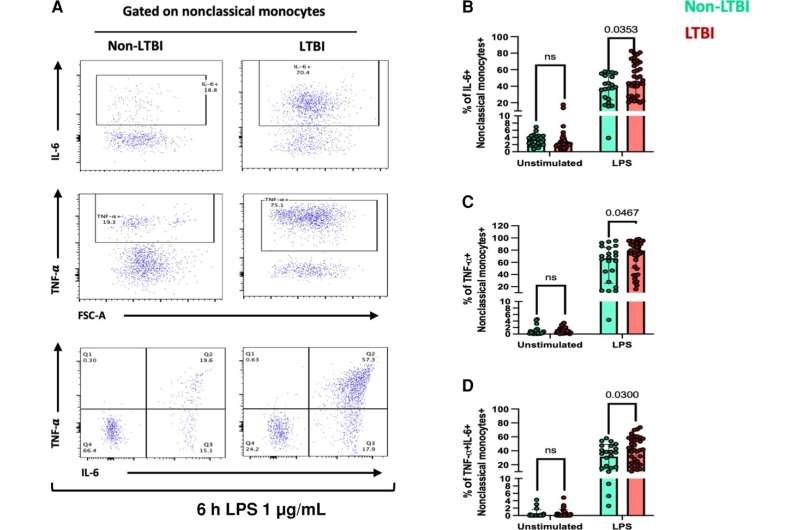This article has been reviewed according to Science X's editorial process and policies. Editors have highlighted the following attributes while ensuring the content's credibility:
fact-checked
trusted source
proofread
Research shows people with latent tuberculosis infection are more prone to inflammation

Newly published research from the University of Cincinnati finds that people with latent tuberculosis infection (LTBI) have more inflammation and could be at a higher risk for cardiovascular disease.
The research was published in Open Forum Infectious Diseases.
Roughly 25% of the world population has LTBI, a state where the individual has been exposed to tuberculosis but is not sick from it, says Moises Huaman, MD, of the Division of Infectious Diseases in the Department of Internal Medicine at the UC College of Medicine and corresponding author on the study.
"Developing countries have higher rates of LTBI," says Huaman. "There are areas in the world where LTBI may affect 50% or so of the population. Here in the United States, the prevalence of LTBI is about 5%, which is still common. It is a global health problem."
The research team analyzed blood samples from individuals with LTBI in Peru between the ages of 40 and 70.
"We focused on monocytes [a type of white blood cell], and we measured markers associated with immune activation and with cardiovascular disease," says Geronimo Feria, research associate in the UC Department of Internal Medicine and first author on the study. "We found differences in the expression of monocyte markers that are important not only for infection control but also for atherogenesis, the process of plaque formation [in the arteries] leading to coronary artery heart disease."
A monocyte is an immune cell that is important for fighting infections like tuberculosis, but also plays a role in cardiovascular health, explains Huaman.
He says another significant element to this research is the role inflammation plays in chronic diseases.
"Anything that leads to an inflammatory state in the body might predispose us to develop chronic diseases. Cardiovascular disease is one of those, along with diabetes, cancer and others," Huaman says. "Our study is pioneering in looking at how monocytes may be more pro-inflammatory in people with LTBI. A natural follow-up question would be whether treating LTBI will help treat that inflammation or not."
Huaman says this study and other research in this area highlights that infections in general have a role in cardiovascular disease risk, as evidenced in cases of influenza, HIV and more recently COVID-19.
"I think this is a connection worth exploring because of how common LTBI is," says Huaman. "The fact that UC is taking a lead on trying to understand how infections affect cardiovascular disease is significant."
More information: Manuel G Feria et al, Pro-Inflammatory Alterations of Circulating Monocytes in Latent Tuberculosis Infection, Open Forum Infectious Diseases (2022). DOI: 10.1093/ofid/ofac629


















